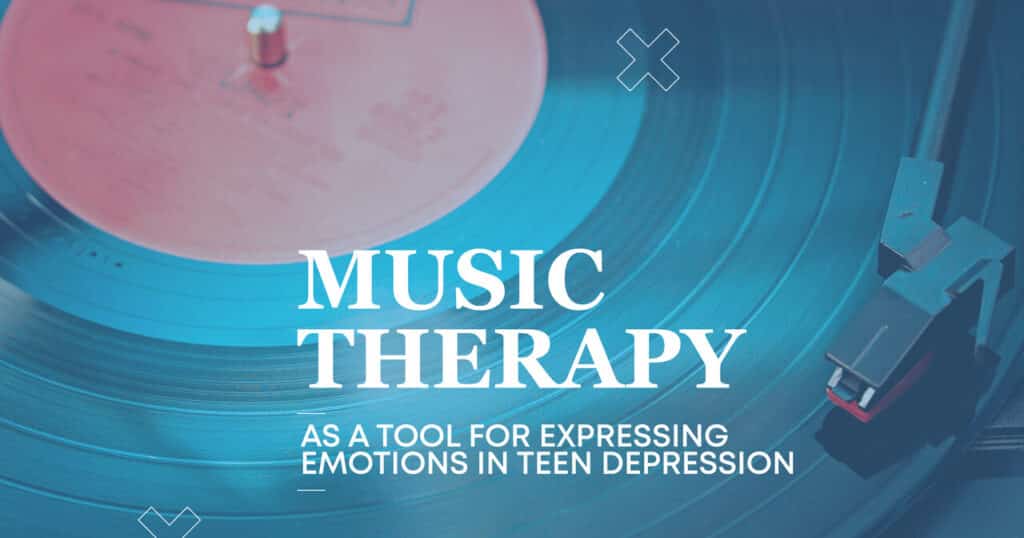The teenage years generally can be a rollercoaster ride of emotions. Between academic stress, social dynamics, and the quest for identity, it’s easy for teens to feel overwhelmed. When these feelings tip into depression, finding a healthy outlet becomes crucial. Enter music therapy, a creative and effective way for teens to express their emotions and manage depression. Let’s dive into how music therapy as a tool for expressing emotions in teen depression can make a world of difference.
What is Music Therapy?
This therapy is more than just listening to your favorite tunes. It’s a clinical and evidence-based practice that uses music to address physical, emotional, mental, and social needs. For teens, it can be a lifeline, offering a way to explore and communicate feelings that might be too complex for words. Whether it’s in music therapy sessions in clinical settings like medical hospitals, or in community programs, the power of music can bring about profound changes in emotional health.
Music therapy methods vary, allowing for a customized approach to therapy. Teens can work with a board-certified music therapist, who, after completing a music therapy degree, is equipped with the necessary skills to guide them through their emotional journey.
Key Components of Music Therapy
- Active Participation: Creating, singing, moving, and/or listening to music.
- Therapeutic Goals: Set by a licensed music therapist to address specific emotional and psychological needs.
- Safe Environment: A supportive space where teens can express themselves without judgment.
- Reflection and Discussion: Analyzing and discussing the music created or experienced to gain deeper insights and form a strong therapeutic relationship.
The Science Behind Music Therapy
Ever wonder why a sad song can make you cry or an upbeat track can lift your spirits? Music’s impact on the brain is profound. It can trigger the release of dopamine, the “feeling of pleasure” neurotransmitter, and reduce cortisol, the stress hormone. These chemical changes can help regulate mood and emotions.
Neurobiological Benefits
- Enhanced Emotional Regulation: Music therapy activates the amygdala, which processes emotions. Neurologic Music Therapy specifically targets brain areas that aid in emotional control.
- Improved Neural Connectivity: Engaging with music strengthens connections between different brain regions. Teens with traumatic brain injuries may benefit significantly from clinical music therapy.
- Mood Stabilization: Music can help balance serotonin levels, essential in mood regulation, which can improve both emotional and physical health.
How Music Therapy as a Tool for Expressing Emotions in Teen Depression Works
Music therapy sessions provide a unique and powerful way for teens to process and express their emotions. Let’s explore how.
Emotional Expression
For many teens, words fall short when trying to describe their feelings. With its wide range of sounds and rhythms, music can convey complex emotions more effectively. Whether it’s through playing an instrument, writing lyrics, or simply listening to a song that resonates, music offers a language all its own.
Stress Relief
Creating or listening to music can be incredibly soothing. Its repetitive and rhythmic nature can help calm the mind and reduce anxiety disorders, so it’s no wonder many people turn to music therapy as a form of treatment.
In community music therapy, teens can work together to make music, providing emotional release and fostering strong social skills that improve overall well-being.
Self-Discovery
Through music therapy techniques like songwriting or improvisation, teens can explore different aspects of their identity. Music therapy major students often learn how music can reveal personal preferences, values, and hidden emotions, fostering greater self-awareness.
Building Resilience
Overcoming the challenges of learning an instrument or composing a song can build a teen’s confidence and resilience. The sense of achievement from mastering a musical piece can be incredibly empowering, adding to their quality of life.
Social Connection
Group music therapy programs allow teens to connect with peers who share similar experiences. Making music together can foster a sense of community and belonging, reducing feelings of isolation often seen in teens with autism spectrum disorder or those recovering from substance abuse.
Techniques Used in Music Therapy
Music therapy methods are versatile, incorporating various techniques to meet the unique needs of each teen. Here are some standard methods:
- Songwriting: Writing lyrics allows teens to articulate their thoughts and feelings creatively. This process can be cathartic and revealing, offering insights into their emotional state.
- Instrumental Play: Playing instruments can be a powerful form of self-expression, helping to develop motor skills, cognitive skills, and musical skills.
- Music Listening: Therapists often use guided listening sessions to explore emotional landscapes.
- Improvisation: Improvisational music-making encourages spontaneity and creativity.
- Movement to Music: Helps teens connect more deeply with their emotions, particularly beneficial in cases of neurological disorders or physical ailments like chronic pain.
Real-Life Applications and Success Stories
Music therapy has been successfully used in medical hospitals, nursing homes, and correctional facilities, where teens have benefitted greatly from this therapy.
- School-Based Music Therapy: Schools use music therapy to support students with emotional and behavioral challenges.
- Hospital Programs: In cancer centers and rehabilitation clinics like Craig Hospital, music therapy provides a distraction from pain and a way to process emotions tied to illness.
- Community Centers: Community-based music therapy services offer a safe space for at-risk teens to explore their emotions.
Getting Started with Music Therapy
If you’re considering music therapy for a teen in your life, here are some steps to take:
- Find a Qualified Music Therapist
Look for a certified music therapist. The American Music Therapy Association (AMTA) offers resources to find professionals with a degree in music therapy and board certification. - Create a Safe Space
A dedicated space for music therapy clinical practice helps teens feel more comfortable. - Explore Different Instruments
Encourage teens to try different instruments; no proficiency is required, just a passion for music.
For those pursuing a career in music therapy, the Music Therapy Internship offers hands-on experience to gain clinical skills. Graduates with a music therapy degree may work in private practices, community mental health centers, or educational settings.
FAQs
What if my teen isn’t musical?
No musical talent is required. Music therapy focuses on the process of creating and experiencing music, not on musical ability.
How long does it take to see results?
The timeline varies for each individual. Some teens may feel the benefits after a few sessions, while others might take longer.
Can music therapy be done at home?
While professional guidance is ideal, many resources are available for trying music therapy techniques at home. However, working with a certified therapist provides a structured and supportive environment.
Does insurance cover music therapy?
Coverage varies by provider and plan. It’s best to check with your insurance company to see if music therapy is included.
Can music therapy be combined with other treatments?
Absolutely. Music therapy can complement other forms of treatment, such as cognitive-behavioral therapy (CBT) or medication.
Final Thoughts
In a world that’s often overwhelming, music therapy offers a creative and effective way for teens to manage depression. By engaging in music, teens can explore their emotions, build resilience, and connect with others. Sound therapy can be an excellent tool for healing and self-expression, whether through songwriting, playing an instrument, or simply listening to a meaningful song.




